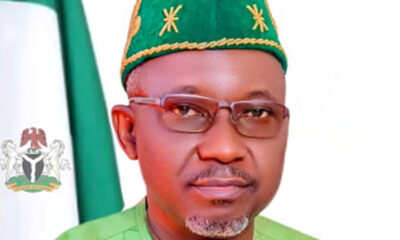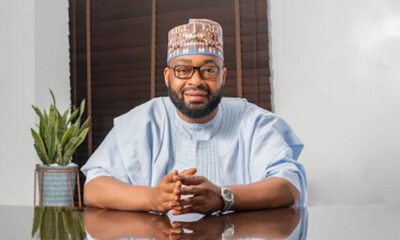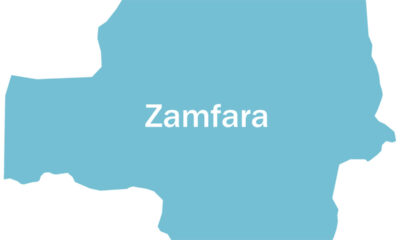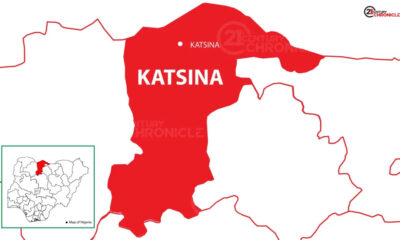metro
Bandits: Residents of Sokoto communities relocate to Niger Republic

Thousands of residents of 17 communities in the Sabon Birni Local Government Area have relocated to Niger Republic over frequent attacks by bandits.
A member of the Sokoto State House of Assembly, representing Sabon Birni North constituency, Aminu Almustapha Boza, disclosed this
Boza said the villagers are currently taking refuge at Tudun Sunnah village, Gidan Runji Local Government in Maradi State of Niger Republic.
The lawmaker, however, alleged that he made several attempts to see Governor Aminu Waziri Tambuwal over their plight but to no avail.
“I have been trying to see the governor but he refused to grant me audience because he knows my reason of seeing him.
“Our people are being killed every day. So far, we counted over 50,000 of them taking refuge in Niger Republic. It took us two days to count them in the presence of Governor of Maradi and chairman of Gidan Runji.
“I am regretting joining politics. I know the kind of support we gave the governor during his re-election because he promised us security, development and others but look at it, my people are suffering and he cannot come or send a delegate or even relief materials to them.
“The last time he (Tambuwal) came to our area was after bandits massacred several people in Tarah area last year where he advised my constituents against taking arms to defend themselves,” he alleged.
However, Governor Aminu Tambuwal denied shunning the lawmaker, saying he has been contacting him over the security situation in his constituency.
The governor spoke through his media aide, stating he had facilitated a meeting between the Commissioner of Police, the Director DSS in the state and the lawmaker during which he was directed to contact any one of them in any distressed situation.
He added that the member was one of the two members invited for the last security meeting but only that of the Isa Constituency attended.
Tambuwal further explained that providing security is a prerogative of the president but despite that the state government would not shy away from its responsibility of ensuring the wellbeing and welfare of its people.
Tambuwal also said that he had called the lawmaker last Thursday before departing the state on an official trip.
But the lawmaker denied being invited to attend any security meeting, just as he admitted talking to the governor on the phone last Thursday during which he asked him to call the Minister of Police Affairs, the Chairman Senate Committee on Defence, Senator Aliyu Wamakko, Senator Ibrahim Gobir and the Chief of Army Staff over the security situation in his area.
He said he responded that he was not the “Chief Security officer” of the state.
“That was the only time he called me and those were what he told me to do,” he alleged.
Boza described the condition of the refugees as pathetic because they were staying in an open place with no toilets, food or drugs.
“They are living under the rain and sun, with nothing from the local and state governments. I bought some bags of garrin rogo, rice and mosquito nets with some drugs for them and I will buy more today. My fear is what will happen if there is any outbreak in the camp,” he said.
He noted that over 300 people lost their lives to banditry in Sabon Birni Local Government Area between 2020 and now.
On why he was blaming Governor Tambuwal while he has no control over security operatives, he said that the governor is the Chief Security Officer of his state.
He said, “We have seen what Governor Zulum is doing in Borno State to bring peace to his people. Today, you will see him at the villa, tomorrow either with Chief of Army Staff or Chief of Air Staff or even at the refugee camp and his efforts are paying because Boko Haram members are voluntarily surrendering themselves to the Army.
“Another example is what his friend and our neighbour, the governor of Zamfara State, is doing to restore peace in the state.
“This is what we want to see from Governor Tambuwal – going to places where he knows we can get help, especially now that the Chief of Army Staff is from Sokoto. He should visit him and solicit for his support because there is no way the federal government can come in without the cooperation of the state government.”
metro
EFCC declares four persons wanted over CBEX scam

EFCC declares four persons wanted over CBEX scam
The Economic and Financial Crimes Commission (EFCC) has declared eight suspects wanted in connection with the alleged loss of approximately N1.3trillion to Crypto Bridge Exchange (CBEX).
Apart from two of the suspects based in Ibadan, the rest six were said to be from Idimu-Egbeda Road in Lagos.
But the EFCC has held on to two suspects it earlier arrested.
 According to a notice by the EFCC’s Head of Media and Publicity, Mr. Dele Oyewale, all the suspects are wanted for “fraud allegedly perpetrated on an online trading platform called Crypto Bridge Exchange (CBEX).”
According to a notice by the EFCC’s Head of Media and Publicity, Mr. Dele Oyewale, all the suspects are wanted for “fraud allegedly perpetrated on an online trading platform called Crypto Bridge Exchange (CBEX).”
The first set of suspects, who are Nigerians, include, Oloyede, Emmanuel Uko, Adefowora Oluwanishola and Adefowora Abiodun Olaonipekun.
The foreigners are Johnson Okiroh Otieno, Israel Mbaluka, Joseph Michiro Kabera and Serah Michiro.
The Adefoworas and Michiros are suspected to be couples.
The statement described the second set of suspects as “foreign accomplices wanted by the EFCC. “
The statement added: “The public is hereby notified that the persons whose photographs appear above are suspected foreign accomplices wanted by the Economic and Financial Crimes Commission (EFCC) for fraud allegedly perpetrated on an online trading platform called Crypto Bridge Exchange (CBEX).
READ ALSO:
- NELFUND gets 500,000 applications for student loans in 11 months
- Farooq Kperogi: In 2027, Tinubu won’t win; the opposition will lose
- Zulum meets with Cameroonian troops after deadly Boko Haram attack in Wulgo
“Anybody with useful information as to their whereabouts should please contact the Commission in its Ibadan, Uyo, Sokoto, Maiduguri, Benin, Makurdi, Kaduna, llorin, Enugu, Kano, Lagos, Gombe, Port Harcourt or Abuja offices or through 08093322644; its e-mail address: info@efcc.gov.ng or the nearest Police Station and other security agencies.”
Asked about those two earlier arrested, a source in EFCC said: “They are still in custody. “
The Director-General of the Security and Exchange Commission (SEC), Dr Emomotimi Agama has said CBEX is unregistered with it.
He said the commission cannot be of help to the victims.
He said: “There is nothing the commission can do”.
“We are worried that this went on for long without anyone drawing our attention to it. That is why we are doing more enlightenment and asking people to come forward to report this for early detection.”
SEC said preliminary investigations revealed that CBEX, which also operates under the corporate identity of ST Technologies International Ltd, Smart Treasure/Super Technology, had held itself out as a digital asset-trading platform, offering high returns to investors in Nigeria.
It said: “The Commission hereby clarifies that neither CBEX nor its affiliates were granted registration by the Commission at any time to operate as a Digital Assets Exchange, solicit investments from the public or perform any other function within the Nigerian capital market.”
EFCC declares four persons wanted over CBEX scam
metro
Two more govs, 40 lawmakers set to dump PDP – Opposition group

Two more govs, 40 lawmakers set to dump PDP – Opposition group
The Nigeria Lawmakers Opposition Coalition has revealed that 40 legislators and two additional governors are on the verge of defecting from the Peoples Democratic Party (PDP), citing disillusionment with the party’s leadership and direction.
Spokesman of the coalition, Hon. Ikenga Imo Ugochinyere, disclosed this during a press conference held on Friday in his hometown of Akokwa.
Ugochinyere expressed disappointment in the current state of the PDP, asserting that its founding fathers would be ashamed of what the once-proud party had become. He accused the current leadership of sabotaging the platform that brought them to prominence.
The coalition demanded the immediate sack of the party’s Acting National Chairman, Umar Damagum; the PDP’s 2023 governorship candidate in Imo State, Senator Samuel Anyanwu; and the expulsion of the Minister of the Federal Capital Territory, Nyesom Wike. They also called for the emergence of a substantive national chairman from the North Central zone to save the party from collapse.
READ ALSO:
- Three people found with human parts arrested in Ogun
- NELFUND gets 500,000 applications for student loans in 11 months
- Farooq Kperogi: In 2027, Tinubu won’t win; the opposition will lose
“For two years, the leaders of this party have failed to find a solution to its internal crisis because they are actively undermining the very platform that made them,” Ugochinyere stated.
He criticized Damagum’s statements invoking divine guidance, questioning his inaction during critical party decisions. “Where was God when you allowed the North Central to be sidelined in appointing an acting chairman? Where was God when you supported APC defectors in court? Or when party structures were handed to APC members? And yet you speak of faith in God?”
He also questioned the continued membership of Wike in the PDP despite his open collaboration with the APC-led federal government.
Ugochinyere further used the platform to draw attention to the severe erosion crisis ravaging his constituency, Ideato. He appreciated the federal government’s intervention in the N25 billion Umuchima erosion control project, commending both federal and state efforts.
“I thank the federal and state governments for their commitment, but in other parts of my constituency, especially the Umuechi-Urualla axis, the erosion is out of control. It’s threatening St. Jude’s Catholic Church, the king’s palace, and federal infrastructure. The situation is dire,” he warned.
He revealed that a previous World Bank erosion control project in the area worth N9 billion had been abandoned due to mismanagement by the former state administration, resulting in worsening conditions.
Two more govs, 40 lawmakers set to dump PDP – Opposition group
metro
Three people found with human parts arrested in Ogun

Three people found with human parts arrested in Ogun
The Ogun State Police command said it has arrested three persons over unlawful possession of human parts in Abeokuta, the state capital.
The command image maker, CSP Omolola Odutola, disclosed this in a statement made available to newsmen in Abeokuta on Friday. The statement said the suspects were arrested on Tuesday following a credible intelligence report.
According to Odutola, the suspects included 36-year-old Sunday Akintobi, Oladimeji Olaniran, and 40-year-old and 38-year-old Isaiah Tijani.
The statement reads, “On April 22, 2025, at about 0800hrs, operatives of the Ogun State Police Command, through its SWAT unit, acted on credible intelligence and apprehended one Sunday Akintobi (male, 36 years), a resident of Itoku area in Abeokuta, suspected of trading in human body parts.”
READ ALSO:
- NELFUND gets 500,000 applications for student loans in 11 months
- Farooq Kperogi: In 2027, Tinubu won’t win; the opposition will lose
- Zulum meets with Cameroonian troops after deadly Boko Haram attack in Wulgo
“Further investigation led to the arrest of two additional individuals: Oladimeji Olaniran (male, 40 years) and Isaiah Tijani (male, 38 years). A search of their residences led to recovery of body parts believed to be human remains.”
“Cerebral bones were also recovered from a location disguised as a Cherubim and Seraphim Church in Kobape town and along Abiola Way in Abeokuta.”
Odutola added that the Commissioner of Police in the State, Lanre Ogunlowo, has directed the State Criminal Investigation Department (SCID) to conduct a discreet investigation into the case to establish the suspects’ full involvement in the heinous crime.
“As a friendly force, the Ogun State Police Command, urges the public to refrain from shielding criminal elements and to provide timely and credible information to security agencies. Such cooperation is crucial in curbing ritual killings and other violent crimes in the state.”
Three people found with human parts arrested in Ogun
-

 metro23 hours ago
metro23 hours agoOmokri : How Tinubu’s political mastery started with Abiola, says El-Rufai, Obi’s forces can’t stop him
-

 Education17 hours ago
Education17 hours agoJAMB officials seize candidates’ hijab at Caleb varsity, Muslim students kick
-

 Entertainment2 days ago
Entertainment2 days agoP-Square: Jude Okoye freed after two months detention
-

 International16 hours ago
International16 hours agoUS releases 41 countries granted 90-day entry without visas (full list)
-

 Politics2 days ago
Politics2 days agoLabour Party collapses into APC in Plateau
-

 Business3 days ago
Business3 days agoNigeria’s gas production increases by 15.6% to 227,931.65 mscf
-

 metro23 hours ago
metro23 hours agoGroom cancels wedding, marries another lady same date, venue
-

 metro2 days ago
metro2 days agoNiger Gov Bago makes U-turn on dreadlocks ban after backlash













